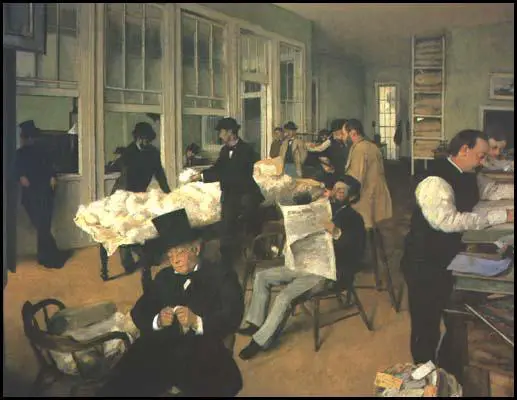Cotton Plantations
A large number of early settlers in America grew cotton. To grow cotton and to pick, gin (remove seeds from the white fluff) and bale it took a great deal of work. Therefore large numbers of slaves were purchased to do this work.
The industry was given a boost invention of Eli Whitney's Cotton Gin in 1793. With the aid of a horse to turn the gin, a man could clean fifty times as much cotton as before. This increased the demand for slaves. For example, in 1803 alone, over 20,000 slaves were being brought into Georgia and South Carolina to work in the cotton fields.
Much of this cotton was exported to Britain where the invention of the Spinning Jenny, the Water Frame and the Power Loom had rapidly increased the demand for raw cotton. By 1850 America was producing 3,000,000 bales of cotton and the industry had become a vital element of the South's economy.

Primary Sources
(1) Moses Roper, Adventures and Escape of Moses Roper (1838)
Mr. Gooch, the cotton planter, he purchased me at a town called Liberty Hill, about three miles from his home. As soon as he got home, he immediately put me on his cotton plantation to work, and put me under overseers, gave me allowance of meat and bread with the other slaves, which was not half enough for me to live upon, and very laborious work. Here my heart was almost broke with grief at leaving my fellow slaves. Mr. Gooch did not mind my grief, for he flogged me nearly every day, and very severely. Mr. Gooch bought me for his son-in-law, Mr. Hammans, about five miles from his residence. This man had but two slaves besides myself; he treated me very kindly for a week or two, but in summer, when cotton was ready to hoe, he gave me task work connected with this department, which I could not get done, not having worked on cotton farms before. When I failed in my task, he commenced flogging me, and set me to work without any shirt in the cotton field, in a very hot sun, in the month of July. In August, Mr. Condell, his overseer, gave me a task at pulling fodder.
Having finished my task before night, I left the field; the rain came on, which soaked the fodder. On discovering this, he threatened to flog me for not getting in the fodder before the rain came. This was the first time I attempted to run away, knowing that I should get a flogging. I was then between thirteen and fourteen years of age. I ran away to the woods half naked; I was caught by a slave-holder, who put me in Lancaster jail. When they put slaves in jail, they advertise for their masters to own them; but if the master does not claim his slave in six months from the time of imprisonment, the slave is sold for jail fees.
When the slave runs away, the master always adopts a more rigorous system of flogging; this was the case in the present instance. After this, having determined from my youth to gain my freedom, I made several attempts, was caught and got a severe flogging of one hundred lashes each time. Mr. Hammans was a very severe and cruel master, and his wife still worse; she used to tie me up and flog me while naked.
Slavery in the United States (£1.29)

